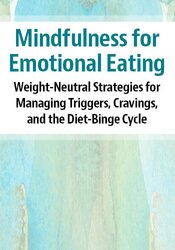
Trending Topics:
×

Many clients recognize the use of unhealthy eating habits to cope with anxiety, depression, and even trauma …
… and as a clinician, you know those habits often exacerbate the very mental health conditions you are aiming to address. But the last thing you want to do is come off as preachy, judgmental, or insensitive.
That’s why psychologist and mindfulness expert Dr. Pavel Somov has used his over 25 years of clinical experience to develop a unique and effective approach to helping clients with emotional eating: Mindful Emotional Eating (MEE). Drawing on the trusted approaches of Effective Emotional Eating and Harm Reduction, MEE could be your key to building mindful eating habits and cultivating a healthier relationship with food!
Dr. Somov will give you:
Don’t miss your opportunity to help your clients improve their mental and physical health and give them the power to take back control of their lives.
Purchase today!
All members of the PESI, Inc. planning committee have provided disclosures of financial relationships with ineligible organizations and any relevant non-financial relationships prior to planning content for this activity. None of the committee members had relevant financial relationships with ineligible companies or other potentially biasing relationships to disclose to learners. For speaker disclosures, please see the faculty biography.
NOTE: Tuition includes one free CE Certificate (participant will be able to print the certificate of completion after passing the online post-test (80% passing score) and completing the evaluation). Instructional methods will include PowerPoint, didactic lecture, and others.
Continuing Education Information: Listed below are the continuing education credit(s) currently available for this non-interactive self-study package. Program content is reviewed periodically per accrediting board rules for currency and appropriateness for credit. Credit approvals are subject to change. Please note, your licensing board dictates whether self-study is an acceptable form of continuing education, as well as which credit types are acceptable for continuing education hours. Please refer to your licensing board's rules and regulations. If your profession is not listed, please contact your licensing board to determine your continuing education requirements and check for reciprocal approval.
For other credit inquiries not specified below, please contact info@pesi.com or 800-844-8260 before purchase.
Materials that are included in this course may include interventions and modalities that are beyond the authorized practice of your profession. As a licensed professional, you are responsible for reviewing the scope of practice, including activities that are defined in law as beyond the boundaries of practice in accordance with and in compliance with your profession's standards.
For Planning Committee disclosures, please see the statement above. For speaker disclosures, please see the faculty biography.
Earn up to 12.5 CE hours. Please see below, for more details, as credit amounts vary by jurisdiction and profession.
PESI, Inc. is approved by the Canadian Counselling and Psychotherapy Association to offer continuing education for counsellors and psychotherapists. PESI, Inc. maintains responsibility for the program. This self-study activity is approved for 12.5 credit hours.

PESI, Inc., #1062, is approved as an ACE provider to offer social work continuing education by the Association of Social Work Boards (ASWB) Approved Continuing Education (ACE) program. Regulatory boards are the final authority on courses accepted for continuing education credit. ACE provider approval period: January 27, 2023 - January 27, 2026. Social workers completing this course receive 12.5 Clinical continuing education credits.
Course Level: Intermediate Format: Recorded asynchronous distance. Full attendance is required; no partial credits will be offered for partial attendance.
Canadian Social Workers: Canadian provinces may accept activities approved by the ASWB for ongoing professional development.
This self-study activity qualifies for 12.5 continuing education clock hours as required by many national and local licensing boards and professional organizations. Save your activity advertisement and certificate of completion, and contact your own board or organization for specific requirements.

This self-study course has been approved by PESI, Inc., as a NAADAC Approved Education Provider, for educational credits. NAADAC Provider #77553. PESI, Inc. is responsible for all aspects of their programming.
This self-study course offers 12.5 continuing education contact hours in the Counseling Services skill group. Full attendance is required; no partial credit will be awarded for partial attendance.

PESI, Inc. is accredited as a provider of nursing continuing professional development by the American Nurses Credentialing Center’s Commission on Accreditation. Nurses completing these self-study materials will earn 12.5 contact hours. Expires: 05/13/2028.
| File type | File name | Number of pages | |
|---|---|---|---|
| Manual - Mindfulness for Emotional Eating (4.9 MB) | 95 Pages | Available after Purchase | |
| Manual - Mindfulness for Emotional Eating - French (4.9 MB) | 95 Pages | Available after Purchase | |
| Manual - Mindfulness for Emotional Eating - Italian (4.9 MB) | 95 Pages | Available after Purchase | |
| Manual - Mindfulness for Emotional Eating - German (4.9 MB) | 95 Pages | Available after Purchase | |
| Manual - Mindfulness for Emotional Eating - Spanish (4.9 MB) | 95 Pages | Available after Purchase |
Access never expires for this product.
For a more detailed outline that includes times or durations of time, if needed, please contact cepesi@pesi.com.
Visit our FAQ page at https://www.pesicanada.ca/faq or contact us at https://www.pesicanada.ca/contact-us.
Satisfaction Guarantee
Your satisfaction is our goal and our guarantee. Concerns should be addressed to info@pesicanada.com.
Please wait ...